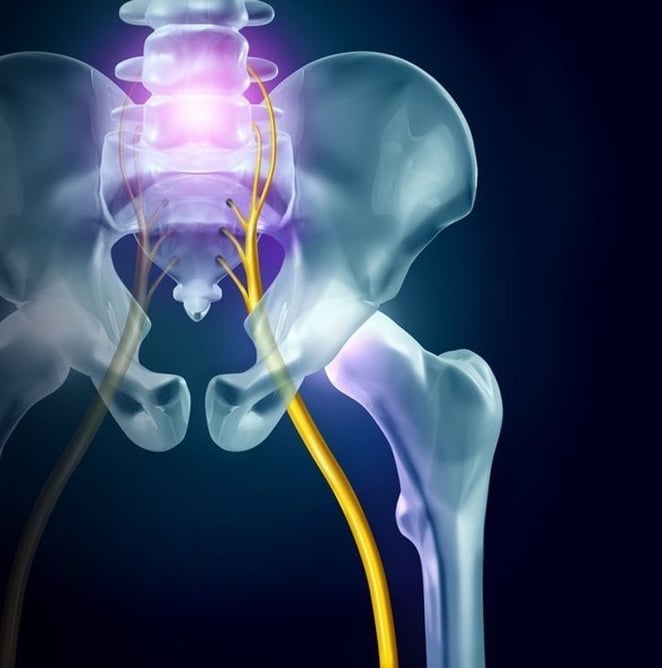Let’s imagine a scenario.
It’s a beautiful autumn morning and you decide you want to make the most of such glorious weather.
You decide that the best way to enjoy your day would be with a relaxing game of frisbee at Piedmont Park. You call your friends together and you all meet up to start playing.
However, when you twist back for the inaugural throw you feel a shooting pain radiate through your lower body. The pain proves to be so bad that you have to pause the game.
Your friend says it may be Sciatica.
What is Sciatica?
It sounds scary and very painful. Many people suffer from Sciatica and some may not even be aware of it.
If you feel this could be you, Arrowhead Clinic's Atlanta Sciatica Pain Relief Chiropractors have compiled and answered this list of eleven questions to give assurance that there is nothing to worry about when it comes to Sciatica, provided proper actions are followed.
Article Table of Contents:
- What is Sciatica?
- Who can be affected by Sciatica?
- What are the symptoms of Sciatica?
- How will it affect me?
- What causes Sciatica?
- Is it curable?
- What are treatment options?
- How long will my recovery take?
- Will my life be any different after my recovery?
- How do I prevent Sciatica?
- Where can I learn more about Sciatica in Atlanta?
1. What is Sciatica?
Sciatica gets its name from the Sciatic nerve which can be found in the lower back. This nerve is the largest nerve in the body and it stretches from the base of the spinal cord down to the buttocks.
The nerve is a pivotal aspect of the nervous system.
The nervous system communicates electrical impulses from the brain to a specific part of the body and produces movement. From the Sciatic nerve, it relates electrical impulses down through the legs. Click here to check out another great resource for Sciatica.
To put it simply, Sciatica is a pain that radiates along the Sciatic nerve.
2. Who can be affected by Sciatica?
Sciatica is the result of a pinched Sciatic nerve. It can potentially happen to anyone. It is often caused by repetitive motion, improper posture, or lack of exercise.
However, there are conditions that may make a person more susceptible to developing this condition.
Age is a definite factor due to weakening bones being unable to fully protect the sciatic nerve.
Obesity has also been known to put pressure spine and pinch the nerve.
Diabetes can also lead to issues with Sciatica due to certain uses of blood sugar weakening the nervous system.
Despite this, anyone can develop sciatic, even if none of these factors are applicable.

3. What are the symptoms of Sciatica?
Typically, Sciatica only affects one side of the body. However, in some cases it has been known to affect both. A typical sign is finding pain radiating along the entire path of the nerve.
However, pain can be found at any specific place along the line. The types of pain can vary widely from a dull ache to sharp pangs.
In severe cases, Sciatica can produce leg weakness and changes in the bladder or bowels.
4. How will it affect me?
There are many variables when it comes to Sciatica.
It all depends on the severity of ones pain. If the pain grows too severe it is recommended that one should see a doctor. However, if ones specific occurrence of Sciatic is not particularly severe, one could potentially continue their day to day life relatively unimpeded.
If a particular occurrence of Sciatica is a result of an activity it will naturally affect ones ability to perform that action.
For example, if you pinch your sciatica while working at a moving company, you may aggravate your condition by continuing to load boxes onto the truck.
Unfortunately, there is no universal answer for how Sciatica will affect a person.
5. What causes Sciatica?
Sciatica is a result of compression on the Sciatic nerve. It can be pinched by any number of things, from a slipped disc to the overgrowth of bone.
In some rare cases, compression can occur as the result of a tumor pushing up against the nerve or it can be due to damage caused by diseases such as diabetes.
There are a number of factors that may make one more prone to developing sciatica. Age, obesity, and even occupation can contribute to developing Sciatica. Jobs that require a large amount of repeated movement reliant on the lower back can cause inflammation in the spine.
However, the opposite has been found to potentially lead to Sciatica as well. Any activity that requires extended amounts of sitting can lead to pinching of the sciatic nerve.

6. Is it curable?
There are many treatments that can reduce the impacts of Sciatica and in some cases completely resolve the condition. When the symptoms are particularly mild, it is not uncommon for it to resolve itself with very little change in behavior.
However, in other cases, treatments may have to be implemented in order to relieve the pressure placed on the nerve.
When pain has subsided, paying a visit to a local chiropractor may help considerably lower the chances of another occurrence.
7. What are treatment options?
Treatments will vary depending on the severity of ones case. In mild cases, simple measures such as mild exercise, over the counter pain medication, stretching and heating/cooling pads may be enough to relieve some occurrences of Sciatica.
If pain does not subside after a week of implementing such methods, it is recommended that one visits a medical professional. From here, based on ones specific case, any number of treatments can be prescribed from steroid injections, to medications, to potentially surgery.
Chiropractic care and physical therapy are beneficial in dealing with lower back pain and recovery.
8. How long will my recovery take?
Once again, a persons recovery time will vary on a case by case basis.
Very mild occurrences of Sciatica may resolve themselves with very little to no special care within a week.
If prescribed medication or scheduled a surgery, recovery times may take considerably longer.
However, in order to keep these recovery times to a bare minimum it is recommended that one follows the instruction given by the medical professional. If this means no repetitive motion for an extended amount of time, do not book a tee time for the following morning.

9. Will my life be any different after my recovery?
If you follow the advice of your medical professional, If you follow the instructions given to you, your life should return to the way it was before.
Potentially, if you follow their advice and take appropriate actions to keep the injury from reoccurring your life may be considerably better.
After visiting a chiropractor for treatment and having your spine aligned, you may find that your overall quality of life has increased since your bout with Sciatica.
10. How do I prevent Sciatica?
Oftentimes, Sciatica is the result of unnecessary stresses on your lower back. This can be a result of an aging spine that can no longer adequately support itself, a repetitive movement performed improperly, or perhaps sitting too long without proper exercise.
Finding times to exercise, developing proper posture, and learning how to use your body to its optimum efficiency can all do wonders in improving your overall health and preventing further issues with your sciatic nerve.
11. Where can I learn more about Sciatica in Atlanta?
Arrowhead Clinic is a wonderful resource for those curious on how to alleviate sciatic pain or how to best prevent having future issues.
Visit our website or come down and see us in person. We can't wait to meet you!
Click the link below for more information regarding Sciatica treatment.



